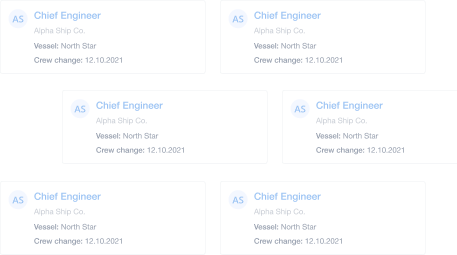Shore-Based Maritime Jobs: What is a Shipbroker Job?

Are you interested in a career in the shipping industry? Maybe you’re thinking ahead for when you graduate and continue your studies, or perhaps you already work in a job at sea and are thinking about transitioning to a land-based maritime job.
Either way, in this series of articles, we’re taking a look at different shore-based jobs in the maritime industry, so whether you’re done working on a cargo ship or you’re deciding what to study next, keep reading as we take a closer look at shipbroker jobs.
What does a shipbroker do?
A shipbroker (also written ship broker) is a professional shore-based job in the maritime industry who facilitates transactions related to the chartering and sale of ships. Shipbrokers act as intermediaries between shipowners, charterers, buyers, and sellers, playing a crucial role in the global shipping trade.
They are often likened to real estate brokers but operate within the unique and specialized context of maritime logistics. Shipbrokers help negotiate and secure contracts for the movement of goods via ships, whether it's securing a vessel for a cargo shipment or arranging the sale and purchase of a vessel.
The role of a shipbroker can vary depending on the segment they specialize in, such as dry bulk, tankers, cargo and container ships, or offshore services.
Read more: Shore-Based Maritime Jobs: What Does a Maritime Lecturer Do?
Each segment has unique requirements, so a shipbroker’s specific duties will vary, but all shipbrokers share common tasks: gathering market intelligence, matching shipping needs with available vessels, negotiating terms, and ensuring smooth contract fulfillment.

A deeper dive into shipbroker jobs
The daily tasks of a shipbroker are dynamic and involve a blend of networking, market research, negotiation, and administrative work. Here’s a breakdown of what shipbrokers typically do as part of their job:
Market research and analysis
Shipbrokers need to be deeply familiar with global shipping trends, market demands, and vessel availability. They monitor changes in freight rates, vessel supply, and demand in various markets. Using this knowledge, brokers provide clients with insights and advice on market conditions, assisting them in making well-informed decisions.
Liaising with clients
Shipbrokers act as intermediaries between shipowners, who supply the vessels, and charterers, who need ships for transporting goods. This process involves communicating with multiple parties to understand their requirements and match their needs with the right vessel. Shipbrokers also build and maintain strong relationships with clients to stay updated on their preferences and needs, allowing them to quickly respond when opportunities arise.
Negotiation and contracting
Negotiation is a key part of a shipbroker’s job. Shipbrokers negotiate freight rates, charter periods, terms and conditions, and other details in charter agreements or sale contracts. They must ensure terms are fair and beneficial for both parties while maximizing value for their clients. For instance, in a voyage charter, the broker will negotiate on voyage terms, including laytime, demurrage, and payment schedules.
Documentation and compliance
Maritime transactions involve extensive documentation, from charter party agreements to bills of lading. Shipbrokers are responsible for ensuring all necessary paperwork is completed and compliant with international regulations, such as those from the International Maritime Organization (IMO) and local maritime authorities.
Post-fixture management
Once a deal is concluded, the shipbroker's work isn't necessarily over. Many shipbrokers assist with operational follow-ups, often referred to as post-fixture services. This may include tracking vessel movements, monitoring port activities, resolving any disputes or delays, and ensuring that all contract terms are adhered to.
Networking and relationship building
In the highly networked world of shipping, relationships are key. Successful shipbrokers often spend a considerable amount of time networking to build a portfolio of contacts across the industry. This network enables them to quickly match vessel availability with shipping demands, facilitating faster and more profitable transactions for their clients.

How to become a shipbroker
The shipbroker profession is open to people from various backgrounds, but it requires a solid understanding of shipping operations, market dynamics, and negotiation. For ex-seafarers with practical maritime experience, transitioning to a maritime job ashore such as shipbroking can be a rewarding option as it allows them to leverage their knowledge of ship operations in a shore-based role.
Here are the steps you might want to consider taking to becoming a shipbroker:
Get education and qualifications
Like other shore-based maritime jobs, such as maritime recruitment officer careers, there are no strict academic requirements to become a shipbroker. However, for shipbroking, having a degree in maritime studies, logistics, international trade, business, or a related field can be advantageous. Several institutions offer specialized courses, including:
- Institute of Chartered Shipbrokers (ICS): ICS is UK-based and offers shipbroking courses that cover chartering, maritime law, and other relevant topics, providing industry-recognized certifications.
- Lloyd’s Maritime Academy: This academy in London, England provides a range of short courses and diplomas, including a popular Shipbroker Diploma Course.
- Other maritime institutes: Many maritime universities offer courses in shipping management, maritime law, and other relevant subjects that can help build a strong foundation.
Search online for shipbroking institutes or academies in your country if the suggestions above aren’t relevant to you.
For ex-seafarers, the operational knowledge gained at sea gives them a valuable edge, as they already understand vessel operations, navigation, and port procedures. This practical knowledge can be supplemented with formal training in chartering, finance, and contract law, which is essential for shipbroking.

Develop market knowledge
The shipping industry operates on a global scale and is heavily influenced by factors like global economic trends, political events, and even weather patterns. To be successful, shipbrokers need to understand how these factors affect freight rates, vessel demand, and supply chain logistics. They can gain this knowledge by:
- Attending industry conferences and networking events.
- Following maritime news sources, like TradeWinds, Lloyd’s List, and the Baltic Exchange.
- Completing specialized courses in chartering, market analysis, and shipping economics.
Gain experience through internships or trainee programs
Many shipping companies, including ship brokerage firms, offer internships or trainee programs that provide practical experience in the field. Ex-seafarers might find it easier to enter directly at a junior level due to their previous industry experience, while newcomers may need to start as interns or trainees to learn the basics of shipbroking. These programs often cover essential skills like negotiation, market analysis, and documentation.
Build a network
Building a professional network is essential in the shipbroking world. Anyone who has worked in a job at sea may already have connections in the maritime industry, which can be beneficial when entering shipbroking.
Joining industry associations, attending shipping conferences, and networking with maritime professionals on platforms like LinkedIn can help aspiring shipbrokers establish a presence in the industry. Professional organizations like the aforementioned Institute of Chartered Shipbrokers or Baltic Exchange also provide opportunities for networking.
Get familiar with shipbroking platforms and tools
Today’s shipbrokers use digital platforms and tools to track shipping activities, gather market intelligence, and facilitate transactions. Some widely used platforms include:
- The Baltic Exchange: Provides information on freight indices, market trends, and pricing benchmarks, which are vital for negotiations.
- Ship tracking platforms (e.g., MarineTraffic, VesselsValue): Allow brokers to monitor vessel movements, cargo statuses, and port activities.
- Brokering platforms (e.g., Veson, IMOS): These platforms offer integrated solutions for managing transactions, documentation, and compliance.

Apply for jobs and continue to learn
Once equipped with the necessary knowledge and skills, aspiring shipbrokers can seek entry-level roles or apply to shipbroking firms. Continuous learning is vital in the rapidly changing shipping industry, so attending industry events, pursuing certifications, and keeping updated on market trends will be essential for long-term success.
What are the key skills a shipbroker needs?
To succeed as a shipbroker, these shore-based maritime professionals need several key skills:
- Negotiation: Effective negotiation is essential to securing profitable and fair deals.
- Analytical thinking: Understanding and interpreting market data helps brokers advise clients effectively.
- Communication: Clear, professional communication helps build trust with clients and colleagues.
- Attention to detail: Managing documentation and contracts requires thoroughness to avoid costly mistakes.
- Adaptability: The shipping industry is fast-paced, so brokers need to be flexible and respond quickly to market changes.
Working as a shipbroker: Final thoughts
There are any number of interesting shore-based maritime jobs, from working in port and harbor management to marine regulatory jobs, and like these careers, the role of a shipbroker is demanding and competitive but can be highly rewarding.

If you’re the type of person who thrives in a dynamic environment and enjoys working in a global industry, shipbroking could be the land-based maritime career for you.
And for anyone who used to work in a seafarer job, or who is thinking of transitioning to a shore-based job in the shipping industry, shipbroking provides a chance to leverage their maritime expertise, offering both career growth and a stable lifestyle.
With a mix of practical maritime experience, a solid foundation in chartering and finance, and strong networking skills, aspiring shipbrokers can establish a fulfilling career in this essential section of the maritime industry.
Read the previous article in this series: Shore-Based Maritime Jobs: How to Become a Marine Surveyor
Read the next article in this series: Shore-Based Maritime Jobs: Port & Harbor Management Jobs

Eve Church
Eve is Martide's content writer, publishing regular posts on everything from our maritime recruitment and crew planning software to life at sea. Eve has been writing professionally for more than two decades, crafting everything from SEO-focused blog posts and website landing pages to magazine articles and corporate whitepapers.
UK

is the only site for maritime jobs



